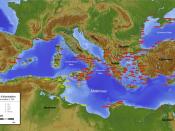Throughout the history of ancient Greece, religion was a mix of different ideas from different cultures and different regions. This often led to some misunderstandings and confusion about certain deities and practices. These misunderstandings sometimes opened doors to new ideas and new dimensions in Greek religion. The story behind the name Linus is one such case of misunderstanding leading to a new facet of Greek religion.
The misunderstanding began when Greek travelers moved through the area of Phoenicia around harvest time. Loud cries in the form of a chant could be heard coming from the fields. These chants must have impressed the Greek travelers, so much so that when they arrived home they felt compelled to make up an explanation for the chant. The one word most easily distinguished by the Greeks seems to have been 'Linou' or 'ai Linou'. The Greeks interpreted this to mean "woe to Linos".
This was the beginning of the misinterpretation, but, as most stories do, the story of Linus would grow bigger.
The meaning of the chant of the harvesters in Phoenicia was easily enough guessed at by the Greeks, but it left some questions. Who was this Linus, and why were all the field workers mourning him? Greek mythology is a history of explaining the unexplained, so of course the Greeks also came up with an explanation of the mournful cry. They explained it thus: Linus was a youth who was raised by a shepherd and then torn to pieces by the shepherds dogs. This story borrows somewhat from the story of an Egyptian youth named Maneros. He, too, died an untimely death and his name and story also came from a misinterpreted harvest lament. The
page 2
Greeks seemed to accept this story, and it has a small place in Greek mythology. But as has already been stated, the Greeks based their story on a misunderstanding.
So what was the truth behind the harvester's cry? The Greeks were not completely wrong in assuming it was a lament. But they were mistaken about who the lament was for. The Phoenician harvesters were not mourning a lost youth; instead they were mourning the death of Adonis, the god they believed they had killed when they reaped the corn. They were not chanting 'ai Linou', instead they were chanting 'ai lanu', which means "woe to us". They felt this dirge necessary to give proper respect to the dying Adonis, and to assure that he would come back the next season and once again bless the crops. Theses "Linus songs", as they came to be known, were not limited to the corn harvest. They were also chanted at the time of harvesting and pressing grapes.
Although later Greek literature might argue otherwise, Linus was never a youth or a deity. It was simply a harvest lament offered to the god who had lived in the crop who was now being killed by the reapers.


